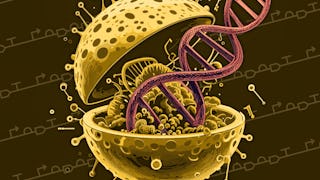Filter by
SubjectRequired
LanguageRequired
The language used throughout the course, in both instruction and assessments.
Learning ProductRequired
LevelRequired
DurationRequired
SkillsRequired
SubtitlesRequired
EducatorRequired
Explore the Biomedical Engineering Course Catalog
 Status: Free Trial
Status: Free TrialArizona State University
Skills you'll gain: Usability, Usability Testing, Problem Solving, Human Factors, User Experience Design, Human Computer Interaction, Human Centered Design, Critical Thinking and Problem Solving, Creativity, Kinesiology, User Research, Decision Making, Human Learning, User Interface (UI), Data Collection, Human Factors Engineering, Human Machine Interfaces, Accident Prevention, Mitigation, Physical Therapy

Caltech
Skills you'll gain: Physical Science, Physics, General Science and Research, Mechanics, Systems Of Measurement, Mathematical Modeling
 Status: Free Trial
Status: Free TrialJohns Hopkins University
Skills you'll gain: Data Science, Data Management, Data-Driven Decision-Making, Project Design, Performance Metric, Software Engineering, Machine Learning, Predictive Modeling, Statistical Inference
 Status: Free Trial
Status: Free TrialSkills you'll gain: Cloud Computing, Linux, Linux Administration, Cloud Security, Operating Systems, Windows PowerShell, Windows Servers, File Systems, System Configuration, Mac OS, Command-Line Interface, Security Controls, Firewall, Virtualization and Virtual Machines, Containerization, User Accounts

Georgia Institute of Technology
Skills you'll gain: Chemistry, Manufacturing Processes, Structural Analysis, Mechanical Engineering, Physical Science, Engineering, Semiconductors, Physics
 Status: Free Trial
Status: Free TrialUniversity of Colorado Boulder
Skills you'll gain: Markov Model, Molecular Biology, Bioinformatics, Mathematical Modeling, Engineering Analysis, Electrical Engineering, Chemical and Biomedical Engineering, Model Based Systems Engineering, Engineering Design Process, Systems Design, Simulations, Biochemistry, Computational Thinking, Failure Analysis, Computational Logic, Differential Equations, Software Visualization, Process Engineering, Numerical Analysis, Molecular, Cellular, and Microbiology
 Status: Free Trial
Status: Free TrialUniversity of Illinois Urbana-Champaign
Skills you'll gain: C++ (Programming Language), Object Oriented Programming (OOP), Object Oriented Design, Development Environment, Engineering Software, Computer Programming, Software Engineering, Data Structures, Debugging, Program Development

Skills you'll gain: Energy and Utilities, International Relations, Economic Development, Natural Resource Management, Environmental Policy, Economics, Political Sciences, Market Dynamics, Environment, Supply And Demand, Forecasting

Duke University
Skills you'll gain: Electrical Power, Electric Power Systems, Energy and Utilities, Basic Electrical Systems, Market Dynamics, Operating Cost, Plant Operations and Management, Operational Efficiency, Environmental Regulations, Regulatory Compliance, Dispatching
 Status: Free Trial
Status: Free TrialUniversity of Toronto
Skills you'll gain: ArcGIS, Spatial Data Analysis, Geographic Information Systems, Geospatial Mapping, Data Mapping, Global Positioning Systems, Data Modeling, Data Capture
 Status: Free Trial
Status: Free TrialUniversity of Virginia
Skills you'll gain: Price Negotiation, Market Dynamics, Product Lifecycle Management, Revenue Management, Competitive Analysis, Target Market, Global Marketing, Market Share, Consumer Behaviour, Business Strategy, Product Strategy, Marketing Psychology, Marketing, Cost Accounting, Customer Insights, Customer Analysis, Value Propositions, Strategic Marketing, Economics, Demand Planning

University of Michigan
Skills you'll gain: Finite Element Methods, Differential Equations, Engineering Analysis, Numerical Analysis, Mathematical Modeling, Mathematical Theory & Analysis, Advanced Mathematics, Applied Mathematics, Linear Algebra, C++ (Programming Language), Calculus, Open Source Technology
Biomedical Engineering learners also search
In summary, here are 10 of our most popular biomedical engineering courses
- Human Factors & Usability Engineering: Designing for Humans: Arizona State University
- The Evolving Universe: Caltech
- A Crash Course in Data Science: Johns Hopkins University
- Operating Systems: Overview, Administration, and Security: IBM
- Material Behavior: Georgia Institute of Technology
- Engineering Genetic Circuits: University of Colorado Boulder
- Object-Oriented Data Structures in C++: University of Illinois Urbana-Champaign
- Politics and Economics of International Energy: Sciences Po
- Electric Industry Operations and Markets: Duke University
- Introduction to GIS Mapping: University of Toronto










